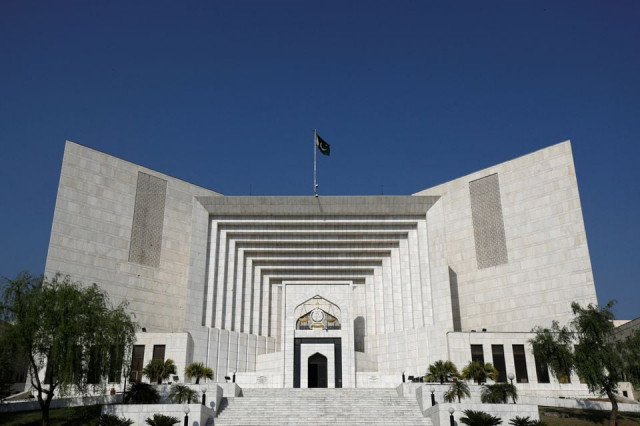Caretaker government in Sindh has yet to take a decision regarding filing of the appeal
Caretaker Sindh CM Justice seeks explanation from Sindh advocate general about filing of appeal without his approval

The interim federal government on Friday filed an intra-court appeal in the Supreme Court against its October 23 judgment declaring the trial of civilians in military courts as unconstitutional.
The appeal was filed through Attorney General for Pakistan (AGP) Mansoor Awan.
The Balochistan government too, through private lawyer Sikandar Bashir Mohmand, has filed an intra-court appeal in the SC to suspend its October 23 verdict.
On October 23, a five-judge SC bench, comprising Justices Ijazul Ahsan, Munib Akhtar, Yahya Afridi, Syed Mazahar Ali Akbar Naqvi and Ayesha Malik, declared that trying civilians in military courts -- for their alleged role in the attacks on army installations during the riots that followed PTI Chairman Imran Khan’s arrest -- was unconstitutional.
It also ordered that the civilians booked for the violence on May 9 and 10 this year should be tried under the ordinary criminal laws.
The appeal filed by the interim federal government read that the incidents of May 9 involved “targeted attacks” on military installations and establishments in an “organised and coordinated manner”.
It added that the attacks were “neither localised nor isolated”.
“The events of [May 9, 2023] indicate a premeditated and intentional attempt to undermine the country’s armed forces and inhibit [its] internal security,” the appeal stated.
The plea further read that following the events of May 9, several FIRs were registered against the perpetrators.
It continued that even through some of the FIRs did not “explicitly mention” the provisions of the Army Act, but the top court had earlier held that it was the contents and not the particular statutory provision which determined the nature of the offences.
It was pointed out in the appeal that the Supreme Court (Practice and Procedure) Act had been declared ultra vires the Constitution and had taken effect since April 21 this year.
It added that in view of the Act having attained constitutional validity, the constitution of the bench was in contravention to the procedure prescribed under Section 2 and 3 of the law.
“Therefore, the judgement is liable to be set aside for having been rendered coram non judice [without jurisdiction] and thus a nullity in the eye of law,” it continued.
It contended that the petitions were not maintainable before the SC in its original jurisdiction under Article 184(3).
The plea maintained that the trial of the accused persons – whether military personnel or otherwise – could not be challenged for being in violation of any of the fundamental Rights including those enshrined in Articles 9, 10-A and 25 of the Constitution.
Read SC rules against civilians’ court martial
The appeal argued that the challenges raised in the petitions could have been adjudicated by the high courts in their original constitutional jurisdiction under Article 199.
It contended that the petitions fell outside the purview of “the contours that this court [SC] had determined for the exercise of its original jurisdiction”.
The plea further pointed out that that offences under Section 2(1)(d)(ii) included those under the Official Secrets Act, which “related to works of defence or naval, military or air force affairs, which may be prejudicial safety, interest, defence, sovereignty, and sanctity of Pakistan”.
“It is clear from the nature of these offences that despite being committed by person who are not members of the armed forces, they are closely related to the proper discharge of duties of such members,” it added.
The appeal argued that Sections 2(1)(d) and 59(4) of the Army Act were “constitutionally insulated from a challenge on the touchstone of fundamental rights and the impugned order/judgement, to the extent that it has failed to appreciate this, has erred in law”.
“Therefore, on this count, the impugned order/judgement is liable to be set aside,” it continued.
The plea read that the judgment, to the extent of finding the provisions of the Army Act unconstitutional on account of Article 175(3) and the requirement therein of separation of judiciary from the executive, was “untenable, contrary to settled jurisprudence of this honourable court and thus, liable to be set aside”.
The Balochistan government in its appeal also urged to top court to set aside its October 23 judgment.
It argued that the judgment did not expressly address or adjudicate upon the provisions of the Pakistan Army Act Rules, 1954, which prescribe and regulate the procedure and process of court martial.
It added that the provisions contained all necessary and appropriate safeguards consistent with basic principles of safe administration of justice in criminal trials and also the requirements of Article 10-A of the Constitution.
Meanwhile, the caretaker government in Sindh has yet to take a decision regarding filing of an appeal against the Supreme Court judgement, declaring the trial of civilians in military courts as unconstitutional.
It is learnt that Caretaker Sindh Chief Minister Justice (retd) Maqbool Baqar has sought explanation from the Sindh advocate general about the filing of appeal without his approval. Upon this, the AG told him that the appeal has not yet filed.
Earlier, the draft of the Sindh government appeal was being shared with the media. According to the draft, the provincial government engaged private counsel Jahanzaib Awan to file the appeal against military courts judgement.
Former Sindh High Court Bar Association (SHCBA) president Salahuddin Ahmed hoped the Sindh government would refrain from participating in the appeal process. “Trial of civilians before military courts is blatantly unconstitutional,” he adds.



















COMMENTS
Comments are moderated and generally will be posted if they are on-topic and not abusive.
For more information, please see our Comments FAQ